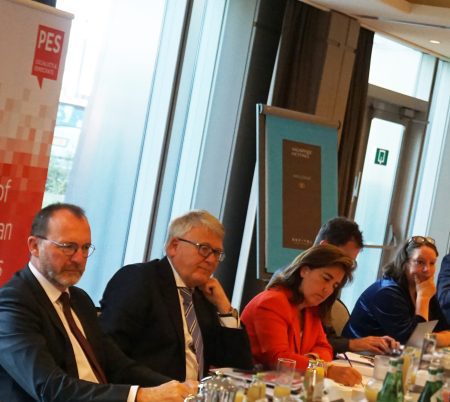Chairing a meeting of PES Employment and Social Affairs Ministers, Portuguese minister of Labour, Solidarity and Social Security, Ana Mendes Godinho, said:
“We have been fighting hard for a Directive that will deliver higher wages for Europe’s lowest paid workers. Work must pay, and it should ensure a decent standard of living in all EU Member States, whether by law or collective bargaining. The Directive on adequate minimum wages aims exactly at this.
“Thanks to the initiative of Commissioner Nicolas Schmit, and the hard work of MEP Agnes Jongerius on the negotiations, the Directive is two steps away from becoming reality. One step in Council, one step in Parliament. With this Directive, the EU can show it is taking the right step for Europe’s workers.”
The PES wants to see wages increase for Europe’s workers and has been fighting for many years for adequate minimum wages – set either by law or collective bargaining – across all Member States. Proposals were included in the PES manifesto for the European elections as far back as 2009. The minimum wages Directive was integrated in the Commission’s agenda in 2019 after PES Spitzenkandidat Frans Timmermans made it a campaign theme for the European Elections and after S&D Group President Iratxe García Pérez made it a precondition for the Group’s support for the 2019-2024 college of Commissioners.
Last week, during trilogue negotiations, Parliament representatives convinced the French Presidency to raise the ambitions of the Directive, paving the way for its adoption. The Directive respects national specificities and it will not impose a statutory minimum wage where it does not exist. It will strengthen collective bargaining, improve adequate minimum wage where it is set by law, and respect the variety of wage setting models across the EU.
The PES EPSCO ministerial meeting also exchanged on the Directive on improving working conditions in platform work and the European Semester.
The meeting was attended by:
- Ana Mendes Godinho, Chair and Minister of Labour, Solidarity and Social Security, Portugal
- Nicolas Schmit, European Commissioner for Jobs and Social Rights, European Commission
- Ivan Krastev, Deputy Minister of Labour and Social Policy, Bulgaria
- Peter Hummelgaard Thomsen, Minister for Employment, Denmark
- Tuula Haatainen, Minister of Employment, Finland
- Hubertus Heil, Federal Minister of Labour and Social Affairs, Germany
- Andrea Orlando, Minister of Labour and Social Policies, Italy
- Georges Engel, Minister of Labour, Employment and the Social and Solidarity Economy, Luxembourg
- Rasmus Cruce Naeyé, State Secretary to the Minister for Employment and Gender Equality, Sweden
- Agnes Jongerius, EMPL Coordinator, S&D group in the European Parliament Chair of PES Social Europe Network
- Ludovic Voet, Confederal Secretary, ETUC



